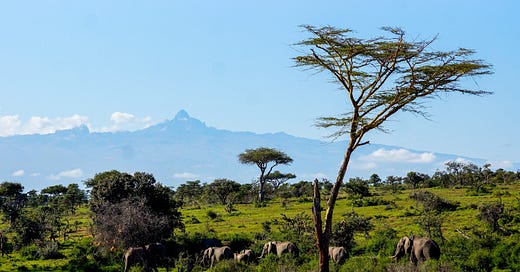Language… had a suggestive power well beyond the immediate and lexical meaning… we learnt the music of our language on top of the content… language gave us a view of the world… - Ngũgĩ wa Thiong’o
The beginning of the year seems to be a good time for sharing round-ups of all sorts. Readers share the books they’ve read while writers list the works they’ve written, and so on. I've decided to march to the same beat but in my own unique way, I list only the Infophilia articles I wrote since September 2023, and I share only my recent readings of Ngũgĩ wa Thiong’o, a world famous African author who lives nearby, two very different books that he’s written (among many). Welcome readers, old and new. Enjoy!
Housekeeping: Infophilia can also be listened to on the Substack App (download from the App store).
Infophilia Roundup (15 September 2023 - 6 January, 2024)
From mid-September 2023 to early January 2024, I’ve written 19 articles. The topics cover a wide range, exploring the impact of the human love of information and the dopamine connection, as well as the influence of new technologies like artificial wombs, driverless cars, connectomics, generative artificial intelligence, and participatory fakery. Themes such as authenticity, authority (copyright), creativity, curiosity, digital resignation, happiness, sustainable resilience, well-being, and cultural shifts like the creator economy all emphasize the interconnectedness of human attributes, societal dynamics, and technology, contributing to the overarching goal of building a positive psychology of information. You can always find these articles in the Archive and Local News and a complete linked list is in Notes.
Celebrating Linguistic Liberation
Decolonising the Mind and The Perfect Nine are books by Ngũgĩ wa Thiong’o, whom Carey Baraka in The Guardian (and others) has called the giant of African Literature. A celebrated poet and novelist, he was jailed in his birth nation of Kenya, East Africa, when he wrote his first play I Will Marry When I Want in Gĩkũyũ rather than English. His subsequent, first novel Devil on the Cross, also in Gĩkũyũ, was written in prison on toilet paper. For over 13 years he’s been a “perennial” annual candidate for the Nobel Prize in Literature.
Born January 5, 1938, in Limuru, Kenya, Ngũgĩ wa Thiong'o is a prolific literary and non-fiction author whose writings engage with themes related to colonialism, identity, language, and cultural politics. These days he’s geographically not that far from me. Since 2002, Ngũgĩ wa has been a professor of Comparative Literature at the University of California, Irvine (UCI). In an interview last year with Carey Baraka, at his home in Irvine, Ngũgĩ continued to uphold his stance about language as a key weapon of subjugation in colonialism: “English is not an African language. French is not. Spanish is not. Kenyan or Nigerian English is nonsense. That’s an example of normalised abnormality. The colonised trying to claim the coloniser’s language is a sign of the success of enslavement. It’s very embarrassing.”




